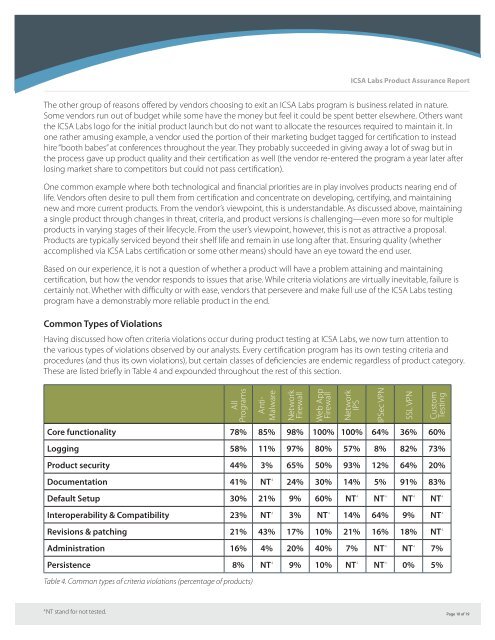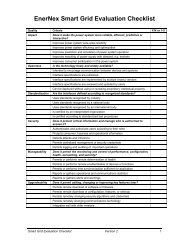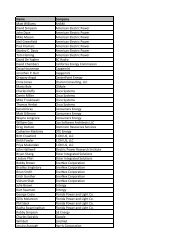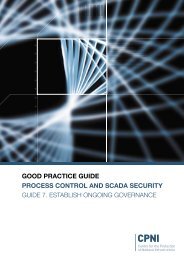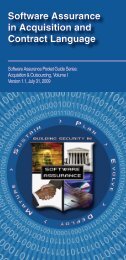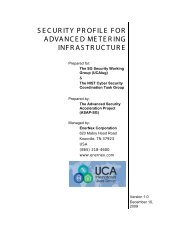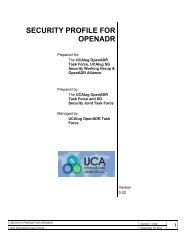<strong>ICSA</strong> <strong>Labs</strong> <strong>Product</strong> <strong>Assurance</strong> <strong>Report</strong>The other group of reasons offered by vendors choosing to exit an <strong>ICSA</strong> <strong>Labs</strong> program is business related in nature.Some vendors run out of budget while some have the money but feel it could be spent better elsewhere. Others wantthe <strong>ICSA</strong> <strong>Labs</strong> logo for the initial product launch but do not want to allocate the resources required to maintain it. Inone rather amusing example, a vendor used the portion of their marketing budget tagged for certification to insteadhire “booth babes” at conferences throughout the year. They probably succeeded in giving away a lot of swag but inthe process gave up product quality and their certification as well (the vendor re-entered the program a year later afterlosing market share to competitors but could not pass certification).One common example where both technological and financial priorities are in play involves products nearing end oflife. Vendors often desire to pull them from certification and concentrate on developing, certifying, and maintainingnew and more current products. From the vendor’s viewpoint, this is understandable. As discussed above, maintaininga single product through changes in threat, criteria, and product versions is challenging—even more so for multipleproducts in varying stages of their lifecycle. From the user’s viewpoint, however, this is not as attractive a proposal.<strong>Product</strong>s are typically serviced beyond their shelf life and remain in use long after that. Ensuring quality (whetheraccomplished via <strong>ICSA</strong> <strong>Labs</strong> certification or some other means) should have an eye toward the end user.Based on our experience, it is not a question of whether a product will have a problem attaining and maintainingcertification, but how the vendor responds to issues that arise. While criteria violations are virtually inevitable, failure iscertainly not. Whether with difficulty or with ease, vendors that persevere and make full use of the <strong>ICSA</strong> <strong>Labs</strong> testingprogram have a demonstrably more reliable product in the end.Common Types of ViolationsHaving discussed how often criteria violations occur during product testing at <strong>ICSA</strong> <strong>Labs</strong>, we now turn attention tothe various types of violations observed by our analysts. Every certification program has its own testing criteria andprocedures (and thus its own violations), but certain classes of deficiencies are endemic regardless of product category.These are listed briefly in Table 4 and expounded throughout the rest of this section.AllProgramsCore functionality 78% 85% 98% 100% 100% 64% 36% 60%Logging 58% 11% 97% 80% 57% 8% 82% 73%<strong>Product</strong> security 44% 3% 65% 50% 93% 12% 64% 20%Documentation 41% NT 4 24% 30% 14% 5% 91% 83%Default Setup 30% 21% 9% 60% NT 4 NT 4 NT 4 NT 4Interoperability & Compatibility 23% NT 4 3% NT 4 14% 64% 9% NT 4Revisions & patching 21% 43% 17% 10% 21% 16% 18% NT 4Administration 16% 4% 20% 40% 7% NT 4 NT 4 7%Persistence 8% NT 4 9% 10% NT 4 NT 4 0% 5%Table 4. Common types of criteria violations (percentage of products)Anti-MalwareNetworkFirewallWeb AppFirewallNetworkIPSIPSec VPNSSL VPNCustomTesting4NT stand for not tested.Page 10 of 19
<strong>ICSA</strong> <strong>Labs</strong> <strong>Product</strong> <strong>Assurance</strong> <strong>Report</strong>Core FunctionalityAccording to our results, a product is more likely to be deficient in performing its primary security function than anyother class of criteria violation. Core functionality, of course, represents something different for each type of product.For Anti-Virus, it means preventing infection. For firewalls and IPS, it’s filtering malicious traffic. Though the contextdiffers, the conclusion is the same: many products don’t (adequately) do whatever it is they were made to do.This finding admittedly has much to do with the focus of testing. While certification criteria address functionality, theyare largely defined around functions central to the product’s purpose. It makes sense, therefore, that testing would oftenuncover these core deficiencies. That it occurs so often among products that have already passed in-house QA and areconsidered by the vendor to be ready for release is a bit more unexpected—and perhaps even unsettling. Surely mostusers would like to think they can rely on a security product to adequately perform its basic purpose.With regard to core functionality, the results in Table 4 warrant a little more explanation. While we do come acrossproducts that are wholly unable to perform functions basic to their kind, it is more often the case that products cannotperform them under certain conditions and/or handle even small variations from “normal.” For instance, we commonlysee firewalls brought to their knees by malformed packets or very trivial single-source denial of service attacks at lessthan T1 speeds. Firewalls, IPS, and AV products are prone to pass packets (or files) that violate security policy whenunder increased load. Many products perform admirably in certain network traffic conditions but degrade sharplywith mixed or real traffic.Another class of problems related to core functionality can only be described as unexpected consequences fromseemingly normal actions, conditions, or settings. Every product in an <strong>ICSA</strong> <strong>Labs</strong> certification program undergoesstandard testing as defined by the criteria, but non-standard tests are also performed when possible—especially forways the product is likely to be used. For instance, we found that when http scanning was turned off in one AV product,it quit scanning other protocols as well though they were still active. Malcode passed through completely undetected.An all-in-one printer/scanner/copier/fax machine tested as part of a Custom Testing engagement was not supposed toprocess documents labeled confidential. It worked fine if documents were oriented properly on the scanner bed but, ona whim, the analyst turned the document 90 degrees and tried again. The document was scanned and faxed as thoughnothing was amiss. Similar things happen quite often and, of course, are reported to the vendor along with any otherstandard criteria violations. Vendors aren’t excited about these unexpected problems but they are relieved becausethey represent vectors that would almost certainly be discovered and exploited through normal use after release.LoggingLogging receives a greater share of testing in some programs than others but it is addressed to at least some extentwithin the criteria of each program. Most of these tests check to make sure the device consistently and correctly recordssome variation of “who did what and when?”. As seen in Table 4, logging capabilities are often found to be deficientacross most programs.The logging problems observed in our labs mostly fall within three categories: the product does not log at all, it logsbut incompletely, or it logs inaccurately. Incompletely can refer to a failure to log all relevant events (i.e., only 8 of 10events are logged) or logging only part of the data elements required on a single event (i.e., capturing the “what” butnot the “when”). As the name implies, a device that logs inaccurately may capture all the right entries and elementsbut these records cannot be used because the information they contain is wrong. Incorrect date and time stampsare a particularly common example of this.Page 11 of 19


